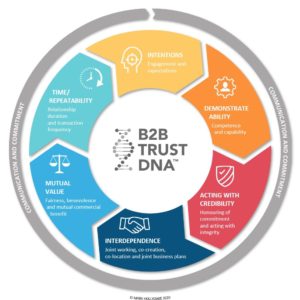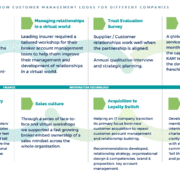Relationship Crises and Trust
Relationship Crises – How the Principles of B2B Trust Can Get You Through
In his last two blogs, Customer Relationship consultant and Customer Attuned co-founder Peter Lavers considers the start of a new business relationship – contract activation – and some distinct occurrences that stress test its resilience, which we call transitions. Contract activation and relationship transitions are discrete occurrences that happen over several months, and require leadership and good programme management to achieve positive outcomes.
In this final blog of the series, Peter considers the relationship crises or catastrophic events within business relationships that require emergency action or intensive relationship recovery.
Things Do Go Wrong
No business has complete immunity to relationship crisis!
However well we plan and risk manage our companies there is always a small chance of an accidental or malicious catastrophe.
Good people can make mistakes or be deceived.
Accidents happen.
Internal and external fraud and malpractice sadly do occur.
Malevolence is real. We may not understand why, but some individuals or agencies would rejoice at your company’s distress or downfall.
A key principle of customer management (and a key indicator of customer centricity) is how well you manage such difficult situations. It has been shown numerous times that a relationship crisis that is recovered from well actually builds trust and loyalty. Conversely, a poor or overly defensive response can compound the situation and ultimately only postpone the inevitable (as many Post Office staff would agree).
How the B2B Trust DNATM Model Can Help
 My colleague Dr Mark Hollyoake has developed an extremely useful Trust DNATM model of B2B Trust (illustrated).
My colleague Dr Mark Hollyoake has developed an extremely useful Trust DNATM model of B2B Trust (illustrated).
It starts with Intentions (joint agreement about the relationship’s aims) and then it quickly gets into the realm of Ability (capability & competence to deliver).
It is most often within this realm that crises occur, when there’s a catastrophic product or service failure for whatever reason. Mutual Value can also be hit hard if financial misconduct is involved.
At the heart of how a company responds and recovers from crises is the Acting with Credibility element of the model.
This is where your values and ethics are truly tested. Most companies have “integrity” somewhere in their statements, but what does this actually mean in a crisis?
Here are five tips about how to actually enhance credibility through a business relationship crisis situation:
- Listen to the experts! Some think it’s a sign of weakness to seek advice. I have never heard a story of a leader regretting following the counsel of people who specialise in relationship recovery or crisis management (when it has gone public) – however uncomfortable it is to do so!
- Rise above blame. One of my favourite quotes is “Every problem has a solution. Changing the past is not a practicable solution”! Whatever the cause, the first priorities are service and customer experience recovery. People can rally around this even if they were involved in some way in its cause. Accountability is of course important, but blame and finger pointing too early can have the opposite of the desired effect – people retreating into their silos and shoring up defences instead of collaborating on a solution. I have seen the wrong people blamed during knee-jerk reactions – those relationships are damaged forever
- Align at leadership level. Shock waves will be passing through both sides of the relationship and it’s vital that staff see consistency and Commitment (one of the other elements of the model) to find and implement a resolution
- Do the right thing for the customer. There’s a real temptation during a crisis to try and control everything, but the best companies actually increase the levels of empowerment and discretion of customer-facing staff. You may be surprised at just how much good can be done and value salvaged when people are given permission to be part of the solution. This was proved many times over during Covid
- Communicate! This is the most important, but should be cognisant of points i-iv. Some royalty and politicians are reputed to live by a rule of “never explain, never apologise”. Well, that couldn’t be more wrong in a business crisis. If you explain the situation well on both the customer and supplier sides you will stand a better chance of their patience and involvement in resolving the situation. A well-crafted apology can also begin the healing process. Some fear that an apology is an admission of guilt, but it doesn’t have to be – being sorry that is different to apologising for! Communication is of course a vital element of the trust model, and when the solution is agreed and programmed this needs to be communicated through every channel and medium open to you
These are just a small selection from Mark’s research, which has uncovered numerous critical incidents, attitudes and behaviours that will either enhance or destroy trust in a crisis.
If you honour commitments and act with integrity throughout, then the final two elements of the Trust DNATM model of B2B Trust will be enhanced. True Interdependence will have been proven, giving you the confidence that you’ll be able to face future challenges together. And you’ll want to extend the relationship (Time/Repeatability element of the model) because you’ll know that you can trust each other in the bad times as well as the good.
We can help
Everyone agrees that trust is vital to good B2B relationships, but most don’t have a way to assess it through the ups and downs of business. This is where our Partner Relationship Survey can help – a proven and cost-effective approach that tracks each element of trust over time.
Do you want to get better at evaluating and managing trust? If so, then please get in touch. We would love to discuss your challenges and opportunities.
- Customer Strategy in the B2B Membership Sector - May 27, 2025
- Build a B2B Customer Strategy - May 20, 2025
- Should you implement NPS in B2B? - January 22, 2025




